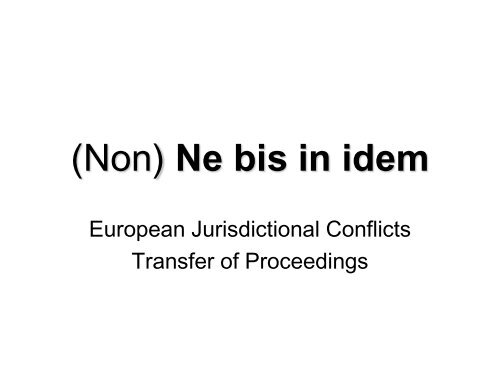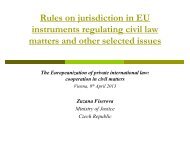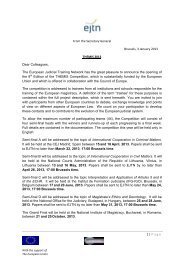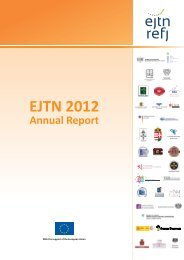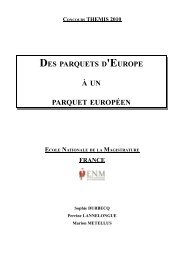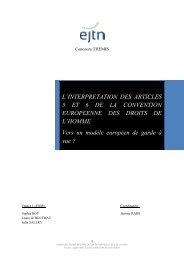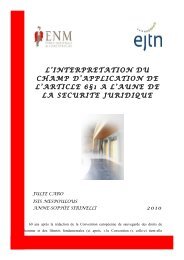International ne bis in idem - EJTN
International ne bis in idem - EJTN
International ne bis in idem - EJTN
You also want an ePaper? Increase the reach of your titles
YUMPU automatically turns print PDFs into web optimized ePapers that Google loves.
(Non) Ne <strong>bis</strong> <strong>in</strong> <strong>idem</strong><br />
European Jurisdictional Conflicts<br />
Transfer of Proceed<strong>in</strong>gs
Overview<br />
Evolution of this pr<strong>in</strong>ciple <strong>ne</strong> <strong>bis</strong> <strong>in</strong> <strong>idem</strong>:<br />
From obstacle to extradition to <strong>in</strong>dividual fundamental right<br />
• Natural law (deriv<strong>in</strong>g from various religions to Don Quichote - cf.<br />
Advocate Ge<strong>ne</strong>ral Colomber, to be seen as part of or lex specialis to<br />
the pr<strong>in</strong>ciple of proportionality – now enshri<strong>ne</strong>d <strong>in</strong>ter alia <strong>in</strong> Art. 49<br />
CFREU<br />
• Obstacle to extradition <strong>in</strong> the <strong>in</strong>terest of sovere<strong>in</strong>gty<br />
• Domestic <strong>in</strong>dividual (at times even fundamental) right<br />
• Art. 14 (7) ICCPR (b<strong>in</strong>d<strong>in</strong>g member states <strong>in</strong>ternally) - however, subject<br />
to <strong>in</strong>terpretation (scope and limits of res judicata)<br />
• Art. 54 CISA emanat<strong>in</strong>g from the right to freedom of movement <strong>in</strong> the<br />
Schengen area, an area of freedom, security and justice<br />
• Art. 50 CFREU (Fundamental right with<strong>in</strong> the European Union)
National <strong>ne</strong> <strong>bis</strong> <strong>in</strong> <strong>idem</strong><br />
Art. 14 (7) ICCPR<br />
No o<strong>ne</strong> shall be liable to be tried or punished aga<strong>in</strong><br />
for an offence for which he has already been f<strong>in</strong>ally<br />
convicted or acquitted <strong>in</strong> accordance with the law<br />
and penal procedure of each country.<br />
3
National <strong>ne</strong> <strong>bis</strong> <strong>in</strong> <strong>idem</strong><br />
Example: Article 103 (3) German Constitution (“Basic Law“<br />
[Grundgesetz])<br />
No person may be punished for the same act more than once<br />
under the ge<strong>ne</strong>ral crim<strong>in</strong>al laws.<br />
‣ Prohibition of multiple crim<strong>in</strong>al prosecution<br />
‣ Pr<strong>in</strong>ciple of s<strong>in</strong>gularity of crim<strong>in</strong>al prosecution<br />
‣ Consequently settled jurisprudence articulates:<br />
„Where two parallel crim<strong>in</strong>al proceed<strong>in</strong>gs are conducted <strong>in</strong><br />
respect of o<strong>ne</strong> and the same acts it is all the more forbidden to<br />
order such measures which would affect the defendant <strong>in</strong> a<br />
particularly sustai<strong>ne</strong>d man<strong>ne</strong>r, i.e. an arrest warrant.“<br />
[BGHSt 38, 54, 57 f.]<br />
4
<strong>International</strong> <strong>ne</strong> <strong>bis</strong> <strong>in</strong> <strong>idem</strong><br />
a) Article 9 European Convention on Extradition of 13 December 1957<br />
(obstacle to extradition)<br />
Extradition shall not be granted if f<strong>in</strong>al judgment has been passed by the<br />
competent authorities of the requested Party upon the person claimed <strong>in</strong> respect<br />
of the offence or offences for which extradition is requested. Extradition may be<br />
refused if the competent authorities of the requested Party have decided either<br />
not to <strong>in</strong>stitute or to term<strong>in</strong>ate proceed<strong>in</strong>gs <strong>in</strong> respect of the same offence or<br />
offences.<br />
b) Article 4 Protocol No. 7 to the ECHR of 22 November 1984<br />
1. No o<strong>ne</strong> shall be liable to be tried or punished aga<strong>in</strong> <strong>in</strong> crim<strong>in</strong>al proceed<strong>in</strong>gs under<br />
the jurisdiction of the same State for an offence for which he has already been<br />
f<strong>in</strong>ally acquitted or convicted <strong>in</strong> accordance with the law and penal procedure of<br />
that State.<br />
2. The provisions of the preced<strong>in</strong>g paragraph shall not prevent the reopen<strong>in</strong>g of the<br />
case <strong>in</strong> accordance with the law and penal procedure of the State concer<strong>ne</strong>d, if<br />
there is evidence of <strong>ne</strong>w or <strong>ne</strong>wly discovered facts, or if there has been a<br />
fundamental defect <strong>in</strong> the previous proceed<strong>in</strong>gs, which could affect the outcome<br />
of the case.<br />
3. No derogation from this Article shall be made under Article 15 of the Convention.<br />
Not ratified by <strong>in</strong>ter alia Germany<br />
5
Excursus: ECPR and CFREU<br />
• OPINION OF ADVOCATE GENERAL Sharpston delivered on 18 October 2012 C-396/11 (Radu)<br />
• 1) The provisions of the Charter of Fundamental Rights of the European Union,<br />
<strong>in</strong>clud<strong>in</strong>g Articles 6, 48 and 52 thereof, form part of the primary law of the<br />
Union. Fundamental rights, as guaranteed by the European Convention for the<br />
Protection of Fundamental Rights and Freedoms, <strong>in</strong>clud<strong>in</strong>g the rights set out <strong>in</strong><br />
Articles 5(1), (3) and (4) and 6(2) and (3) of the Convention, constitute ge<strong>ne</strong>ral<br />
pr<strong>in</strong>ciples of Union law.[…]<br />
• (3) The competent judicial authority of the Member State execut<strong>in</strong>g a European<br />
arrest warrant can refuse the request for surrender without be<strong>in</strong>g <strong>in</strong> breach of<br />
the obligations authorised by the found<strong>in</strong>g Treaties and the other provisions of<br />
European Union law, where it is shown that the human rights of the person<br />
whose surrender is requested have been <strong>in</strong>fr<strong>in</strong>ged, or will be <strong>in</strong>fr<strong>in</strong>ged, as part<br />
of or follow<strong>in</strong>g the surrender process. However, such a refusal will be<br />
competent only <strong>in</strong> exceptional circumstances. In cases <strong>in</strong>volv<strong>in</strong>g Articles 5 and<br />
6 of the Convention and/or Articles 6, 47 and 48 of the Charter, the <strong>in</strong>fr<strong>in</strong>gement<br />
<strong>in</strong> question must be such as fundamentally to destroy the fair<strong>ne</strong>ss of the<br />
process. …
<strong>International</strong> <strong>ne</strong> <strong>bis</strong> <strong>in</strong> <strong>idem</strong> – further examples 1<br />
a) Article 1 Convention between the Member States of the EC on Double Jeopardy of 25 May<br />
1987<br />
A person whose trial has f<strong>in</strong>ally been disposed of <strong>in</strong> a Member State may not be prosecuted <strong>in</strong><br />
another Member State <strong>in</strong> respect of the same facts, provided that if a sanction is imposed, it has<br />
been enforced, is actually <strong>in</strong> the process of be<strong>in</strong>g enforced or can no longer be enforced under the<br />
laws of the sentenc<strong>in</strong>g state.<br />
b) Article VII (8) NATO-Status of Forces Treaty of 19 Ju<strong>ne</strong> 1951 (SOFA)<br />
Where an accused has been tried <strong>in</strong> accordance with the provisions of this Article by the authorities<br />
of o<strong>ne</strong> Contract<strong>in</strong>g Party and has been acquitted, or has been convicted and is serv<strong>in</strong>g, or has<br />
served, his sentence or has been pardo<strong>ne</strong>d, he may not be tried aga<strong>in</strong> for the same offence with<strong>in</strong><br />
the same territory by the authorities of another Contract<strong>in</strong>g Party. However, noth<strong>in</strong>g <strong>in</strong> this paragraph<br />
shall prevent the military authorities of the send<strong>in</strong>g State from try<strong>in</strong>g a member of its force for any<br />
violation of rules of discipli<strong>ne</strong> aris<strong>in</strong>g from an act or omission which constituted an offence for which<br />
he was tried by the authorities of another Contract<strong>in</strong>g Party.<br />
c) Article 4 Treaty between Australia and the Federal Republic of Germany concern<strong>in</strong>g<br />
Extradition of 14 April 1987<br />
1. Extradition shall not be granted if:<br />
a) the person claimed has already been tried and acquitted or convicted by the competent authorities<br />
of the Requested State for the offence <strong>in</strong> respect of which his extradition is requested; or<br />
b) crim<strong>in</strong>al proceed<strong>in</strong>gs <strong>in</strong>itiated aga<strong>in</strong>st the person claimed for the offence <strong>in</strong> respect of which<br />
extradition is requested have been discont<strong>in</strong>ued f<strong>in</strong>ally by the competent authorities of the Requested<br />
State, the person claimed hav<strong>in</strong>g complied with the conditions imposed on him.<br />
2. Extradition may be refused if the person claimed has already been tried and acquitted or convicted<br />
by the competent authorities of a third State for the offence <strong>in</strong> respect of which his extradition is<br />
requested.<br />
3. Extradition may be refused if the person claimed is under exam<strong>in</strong>ation or trial <strong>in</strong> the Requested<br />
State for the offence <strong>in</strong> respect of which his extradition is requested.<br />
4. Subject to paragraph (1) (b), a decision by the competent authorities of the Requested State not to<br />
<strong>in</strong>itiate or to stop proceed<strong>in</strong>gs aga<strong>in</strong>st the person claimed <strong>in</strong> respect of an offence shall not be a<br />
reason to refuse extradition <strong>in</strong> respect of the same offence.<br />
7
<strong>International</strong> <strong>ne</strong> <strong>bis</strong> <strong>in</strong> <strong>idem</strong> – further examples 2<br />
d) Article 10 ICTY Statute<br />
1. No person shall be tried before a national court for acts constitut<strong>in</strong>g serious violations of <strong>in</strong>ternational<br />
humanitarian law under the present Statute, for which he or she has already been tried by the <strong>International</strong><br />
Tribunal.<br />
2. A person who has been tried by a national court for acts constitut<strong>in</strong>g serious violations of <strong>in</strong>ternational<br />
humanitarian law may be subsequently tried by the <strong>International</strong> Tribunal only if:<br />
a) the act for which he or she was tried was characterized as an ord<strong>in</strong>ary crime; or<br />
b) the national court proceed<strong>in</strong>gs were not impartial or <strong>in</strong>dependent, were desig<strong>ne</strong>d to shield the<br />
accused from <strong>in</strong>ternational crim<strong>in</strong>al responsibility, or the case was not diligently prosecuted.<br />
…<br />
e) Article 20 ICC Statute<br />
1. Except as provided <strong>in</strong> this Statute, no person shall be tried before the Court with respect to conduct which<br />
formed the basis of crimes for which the person has been convicted or acquitted by the Court.<br />
2. No person shall be tried by another court for a crime referred to <strong>in</strong> article 5 for which that person has already<br />
been convicted or acquitted by the Court.<br />
3. No person who has been tried by another court for conduct also proscribed under article 6, 7 or 8 shall be tried<br />
by the Court with respect to the same conduct unless the proceed<strong>in</strong>gs <strong>in</strong> the other court:<br />
a) were for the purpose of shield<strong>in</strong>g the person concer<strong>ne</strong>d from crim<strong>in</strong>al responsibility for crimes with<strong>in</strong><br />
the jurisdiction of the Court; or<br />
b) otherwise were not conducted <strong>in</strong>dependently or impartially <strong>in</strong> accordance with the norms of due process<br />
recognized by <strong>in</strong>ternational law and were conducted <strong>in</strong> a man<strong>ne</strong>r which, <strong>in</strong> the circumstances, was<br />
<strong>in</strong>consistent with an <strong>in</strong>tent to br<strong>in</strong>g the person concer<strong>ne</strong>d to justice.<br />
8
German Federal Constitutional Court 2<br />
BVerfG 15 Dec. 2011, 2 BvR 148/11, para. no.31<br />
(decision non accept<strong>in</strong>g a compla<strong>in</strong>t)<br />
… [A]t present there is no identifiable ge<strong>ne</strong>ral rule of<br />
<strong>in</strong>ternational law <strong>in</strong> the mean<strong>in</strong>g of Art. 25 §1 German Constitution<br />
([Grundgesetz]), accord<strong>in</strong>g to which no person shall be prosecuted<br />
or punished aga<strong>in</strong> for the same facts (=acts) [identischer<br />
Sachverhalt] for which he has already been f<strong>in</strong>ally acquitted or<br />
convicted by another State.<br />
See already: [BVerfGE 75, 1 ] and [BVerfGK 13, 7 ]<br />
9
<strong>International</strong> <strong>ne</strong> <strong>bis</strong> <strong>in</strong> <strong>idem</strong><br />
Article 54 Convention of 19 Ju<strong>ne</strong> 1990<br />
Implement<strong>in</strong>g the Schengen Agreement (CISA)<br />
A person whose trial has been f<strong>in</strong>ally disposed of <strong>in</strong> o<strong>ne</strong><br />
Contract<strong>in</strong>g Party may not be prosecuted <strong>in</strong> another Contract<strong>in</strong>g<br />
Party for the same acts provided that, if a penalty has been<br />
imposed, it has been enforced, is actually <strong>in</strong> the process of be<strong>in</strong>g<br />
enforced or can no longer be enforced under the laws of the<br />
sentenc<strong>in</strong>g Contract<strong>in</strong>g Party.<br />
Article 50 Charter of Fundamental Rights of the EU (CFREU)<br />
No o<strong>ne</strong> shall be liable to be tried or punished aga<strong>in</strong> <strong>in</strong> crim<strong>in</strong>al<br />
proceed<strong>in</strong>gs for an offence for which he or she has already been<br />
f<strong>in</strong>ally acquitted or convicted with<strong>in</strong> the Union <strong>in</strong> accordance with<br />
the law.<br />
10
Applicability of Art. 54 – 58 CISA?<br />
• The Accession Treaty with Croatia, sig<strong>ne</strong>d <strong>in</strong> Brussels on 9 December 2011, reads<br />
<strong>in</strong>ter alia:<br />
• List of provisions of the Schengen acquis as <strong>in</strong>tegrated <strong>in</strong>to the framework of<br />
the European Union and the acts build<strong>in</strong>g upon it or otherwise related to it, to<br />
be b<strong>in</strong>d<strong>in</strong>g on, and applicable <strong>in</strong>, the Republic of Croatia as of accession<br />
(referred to <strong>in</strong> Article 4(1) of the Act of Accession)<br />
• 1. The Agreement between the Governments of the States of the Be<strong>ne</strong>lux Economic<br />
Union, the Federal Republic of Germany and the French Republic on the gradual<br />
abolition of checks at their common borders dated 14 Ju<strong>ne</strong> 1985<br />
• 2. The follow<strong>in</strong>g provisions of the Convention sig<strong>ne</strong>d <strong>in</strong> Schengen on 19 Ju<strong>ne</strong> 1990<br />
implement<strong>in</strong>g the Schengen Agreement of 14 Ju<strong>ne</strong> 1985 on the gradual abolition of<br />
checks at their common borders, its related F<strong>in</strong>al Act and Jo<strong>in</strong>t Declarations, as<br />
amended by certa<strong>in</strong> of the acts listed <strong>in</strong> paragraph 8 of this An<strong>ne</strong>x: Article 1 to the<br />
extent that it relates to the provisions of this paragraph; Article 26; Article 39;Articles<br />
44 to 49 (with the exception of Article 47(4) and Article 49(a)), Article 51,Articles 54<br />
to 58; Article 62(3); Articles 67 to 69; Articles 71 and 72; Articles 75 and 76;Article 82;<br />
Article 91;…….
German Federal Court of Justice<br />
decision of 25 October 2010<br />
(BGH - 1 StR 57/10)<br />
The prohibition of double jeopardy <strong>in</strong> Art. 50 CFREU is, as opposed<br />
to the correspond<strong>in</strong>g prohibition <strong>in</strong> Art. 54 CISA, not expressly<br />
modified by an execution clause. Pursuant to Art. 52(1) CFREU,<br />
however, the rights enshri<strong>ne</strong>d <strong>in</strong> the Charter can be restricted by<br />
laws that respect the essence of the Charter. Art. 54 CISA<br />
represents such a restriction.<br />
Therefore Art. 50 CFREU beyond doubt only applies <strong>in</strong> accordance<br />
with Art. 54 CISA […].<br />
12
German Federal Constitutional Court 1<br />
BVerfG 15 December 2011, 2 BvR 148/11<br />
para. no. 43<br />
Further:<br />
This <strong>in</strong>terpretation of the [German] Federal Court of Justice appears<br />
to be justifiable […].<br />
It is also justifiable to understand the explanations [*] relat<strong>in</strong>g to<br />
article 50 CFR as <strong>in</strong>terpreted by the [German] Federal Court of<br />
Justice, accord<strong>in</strong>g to which the enforcement element of article 54<br />
CISA presents a permissible limitation to article 50 CFR.<br />
* Explanations relat<strong>in</strong>g to the Charter of Fundamental Rights (2007/C 303/02)<br />
13
Other approaches <strong>in</strong> Greece (Supreme Court) and elsewhere (e.g. District<br />
Court Milano (Tribunale di Milano, 6 July 2011,D+S 1795/11)<br />
• AREIOS PAGOS (HELLENIC SUPREME COURT)<br />
• Decision No 1/2011 (<strong>in</strong> pleno)<br />
• Non official Summary:<br />
• Article 54 of the Schengen Convention (CISA) establishes a trans-border <strong>ne</strong> <strong>bis</strong> <strong>in</strong><br />
<strong>idem</strong> rule. As a State-Party to CISA Greece has filed a declaration accord<strong>in</strong>g to<br />
Article 55 CISA <strong>in</strong>clud<strong>in</strong>g reservations which exempt drug traffick<strong>in</strong>g crimes from the<br />
application of the <strong>ne</strong> <strong>bis</strong> <strong>in</strong> <strong>idem</strong> rule.<br />
• Article 50 of the Charter of Fundamental Rights of the European Union establishes<br />
the right not to be prosecuted or convicted twice for the same act as a fundamental<br />
right accord<strong>in</strong>g to Article 6(1) of the Treaty of the European Union.<br />
• This right is l<strong>in</strong>ked to the pr<strong>in</strong>ciple of mutual recognition of court judgments and<br />
orders enshri<strong>ne</strong>d <strong>in</strong> Article 69A(1) of the Treaty of the European Union.<br />
• Article 50 of the Charter is a directly applicable provision accord<strong>in</strong>g to Article 51(1)<br />
and is clear <strong>in</strong> its word<strong>in</strong>g. The requirements for the application of Article 50 of the<br />
Charter shall be defi<strong>ne</strong>d on the basis of its autonomous <strong>in</strong>terpretation.<br />
• The declaration filed by Greece under Article 55 CISA exclud<strong>in</strong>g drug traffick<strong>in</strong>g<br />
crimes from the application of the <strong>ne</strong> <strong>bis</strong> <strong>in</strong> <strong>idem</strong> rule has been abolished by the<br />
Treaty of Lisbon and the Charter given that Article 50 of the Charter does not provide<br />
for exceptions from this rule.
ECJ on Art. 54 CISA<br />
• ECJ,Judgment of 11. 2. 2003, C-187 + 385/01 Gözutök und<br />
Brügge<br />
• ECJ Judgment of / 10. 3. 2005, C-469/03 – Miraglia<br />
• ECJ Judgment of 9. 3. 2006, C-436/04 – Van Esbroeck<br />
• ECJ Judgment of 28. 9. 2006, C-150/05 – Van Straaten<br />
• ECJ Judgment of 28. 9. 2006, C-467/04 – Gaspar<strong>in</strong>i<br />
• ECJ Judgment of 18. 7. 2007, C-288/05 – Kretz<strong>in</strong>ger<br />
• ECJ Judgment of 18. 7. 2007, C-367/05 – Kraaijenbr<strong>in</strong>k<br />
• ECJ Judgment of 11. 12. 2008, C-297/07 – Bourqua<strong>in</strong><br />
• ECJ Judgment of 22. 12. 2008, C-491/07 – Turansky<br />
• ECJ Judgment of 16. 11. 2010, C-261/09 – Mantello<br />
•<br />
15
Still pend<strong>in</strong>g: M C-389<br />
• Reference for a prelim<strong>in</strong>ary rul<strong>in</strong>g from the Tribunale<br />
di Fermo (Case C-398/12)<br />
• Language of the case: Italian<br />
• Question referred<br />
• Does a f<strong>in</strong>al judgment of no case to answer given by a<br />
Member State of the European Union party to the<br />
Convention implement<strong>in</strong>g the Schengen Agreement<br />
(CISA), [1] follow<strong>in</strong>g an extensive prelim<strong>in</strong>ary<br />
<strong>in</strong>vestigation as part of <strong>in</strong>vestigations <strong>in</strong> con<strong>ne</strong>ction with<br />
proceed<strong>in</strong>gs which could be re-activated <strong>in</strong> the event of<br />
fresh evidence, preclude the <strong>in</strong>itiation or conduct of<br />
proceed<strong>in</strong>gs <strong>in</strong> respect of the same facts and the same<br />
person <strong>in</strong> another Contract<strong>in</strong>g State.
Toshiba JUDGMENT OF THE ECJ (Grand Chamber) of 14 February<br />
2012 - Case C-17/10<br />
• (Competition – Cartel which commenced before the accession of a State to<br />
the European Union – Ne <strong>bis</strong> <strong>in</strong> <strong>idem</strong> pr<strong>in</strong>ciple)<br />
• Recital 37 of Regulation No 1/2003 provides: ‘This Regulation respects the<br />
fundamental rights and observes the pr<strong>in</strong>ciples recognised <strong>in</strong> particular by the Charter<br />
of Fundamental Rights of the European Union (“the Charter”).<br />
• In <strong>in</strong>terpret<strong>in</strong>g a provision of EU law, it is <strong>ne</strong>cessary to consider not only its word<strong>in</strong>g, but also the context <strong>in</strong> which it<br />
occurs and the objectives pursued by the rules of which it is part.<br />
• It is of little importance that the decision whereby the said authority imposed fi<strong>ne</strong>s relates to a period prior to the<br />
accession of the Czech Republic to the Union.<br />
• The <strong>ne</strong> <strong>bis</strong> <strong>in</strong> <strong>idem</strong> pr<strong>in</strong>ciple does not preclude penalties which the<br />
national competition authority of the Member State concer<strong>ne</strong>d<br />
imposes on undertak<strong>in</strong>gs participat<strong>in</strong>g <strong>in</strong> a cartel on account of the<br />
anti-competitive effects to which the cartel gave rise <strong>in</strong> the territory of<br />
that Member State prior to its accession to the European Union, where<br />
the fi<strong>ne</strong>s imposed on the same cartel members by a Commission<br />
decision taken before the decision of the said national competition<br />
authority was adopted were not desig<strong>ne</strong>d to penalise the said effects.<br />
17
Coord<strong>in</strong>ation: Treaty of Lisbon 1<br />
Article 67 Treaty on the Function<strong>in</strong>g of the European Union (TFEU)<br />
1. The Union shall constitute an area of freedom, security and justice with respect for<br />
fundamental rights and the different legal systems and traditions of the Member<br />
States.<br />
2. It shall ensure the absence of <strong>in</strong>ternal border controls for persons and shall frame a<br />
common policy on asylum, immigration and external border control, based on<br />
solidarity between Member States, which is fair towards third-country nationals. For<br />
the purpose of this Title, stateless persons shall be treated as third-country nationals.<br />
3. The Union shall endeavour to ensure a high level of security through measures to<br />
prevent and combat crime, racism and xenophobia, and through measures for<br />
coord<strong>in</strong>ation and cooperation between police and judicial authorities and other<br />
competent authorities, as well as through the mutual recognition of judgments <strong>in</strong><br />
crim<strong>in</strong>al matters and, if <strong>ne</strong>cessary, through the approximation of crim<strong>in</strong>al laws.<br />
4. The Union shall facilitate access to justice, <strong>in</strong> particular through the pr<strong>in</strong>ciple of<br />
mutual recognition of judicial and extrajudicial decisions <strong>in</strong> civil matters.<br />
18
Excursus: Multiple surrender<br />
• JUDGMENT OF THE COURT (Second Chamber) of 28<br />
Ju<strong>ne</strong> 2012 In Case C-192/12 (PPU),<br />
• Article 28(2) of Council Framework Decision<br />
2002/584/JHA of 13 Ju<strong>ne</strong> 200[…] must be <strong>in</strong>terpreted<br />
as mean<strong>in</strong>g that, where a person has been subject to<br />
more than o<strong>ne</strong> surrender between Member States<br />
pursuant to successive European arrest warrants,<br />
the subsequent surrender of that person to a<br />
Member State other than the Member State hav<strong>in</strong>g<br />
last surrendered him is subject to the consent only<br />
of the Member State which carried out that last<br />
surrender.
Interpretation: Treaty of Lisbon 2<br />
Article 267 TFEU<br />
The Court of Justice of the European Union shall have jurisdiction to give prelim<strong>in</strong>ary<br />
rul<strong>in</strong>gs concern<strong>in</strong>g:<br />
(a) the <strong>in</strong>terpretation of the Treaties;<br />
(b) the validity and <strong>in</strong>terpretation of acts of the <strong>in</strong>stitutions, bodies, offices or agencies<br />
of the Union;<br />
Where such a question is raised before any court or tribunal of a Member State, that<br />
court or tribunal may, if it considers that a decision on the question is <strong>ne</strong>cessary to<br />
enable it to give judgment, request the Court to give a rul<strong>in</strong>g thereon.<br />
Where any such question is raised <strong>in</strong> a case pend<strong>in</strong>g before a court or tribunal of a<br />
Member State aga<strong>in</strong>st whose decisions there is no judicial remedy under national<br />
law, that court or tribunal shall br<strong>in</strong>g the matter before the Court.<br />
If such a question is raised <strong>in</strong> a case pend<strong>in</strong>g before a court or tribunal of a Member<br />
State with regard to a person <strong>in</strong> custody, the Court of Justice of the European Union<br />
shall act with the m<strong>in</strong>imum of delay.<br />
20
Article 82 TFEU<br />
Conflicts of jurisdiction:<br />
Treaty of Lisbon 3<br />
1. Judicial cooperation <strong>in</strong> crim<strong>in</strong>al matters <strong>in</strong> the Union shall be based<br />
on the pr<strong>in</strong>ciple of mutual recognition of judgments and judicial<br />
decisions and shall <strong>in</strong>clude the approximation of the laws and<br />
regulations of the Member States <strong>in</strong> the areas referred to <strong>in</strong><br />
paragraph 2 and <strong>in</strong> Article 83.<br />
The European Parliament and the Council, act<strong>in</strong>g <strong>in</strong> accordance<br />
with the ord<strong>in</strong>ary legislative procedure, shall adopt measures to:<br />
(a) lay down rules and procedures for ensur<strong>in</strong>g recognition<br />
throughout the Union of all forms of judgments and judicial<br />
decisions;<br />
(b) prevent and settle conflicts of jurisdiction between Member<br />
States;<br />
(c) support the tra<strong>in</strong><strong>in</strong>g of the judiciary and judicial staff;<br />
(d) facilitate cooperation between judicial or equivalent authorities of<br />
the Member States <strong>in</strong> relation to proceed<strong>in</strong>gs <strong>in</strong> crim<strong>in</strong>al matters and<br />
the enforcement of decisions.<br />
…<br />
21
Eurojust: Treaty of Lisbon 4<br />
Article 85 TFEU<br />
1. Eurojust’s mission shall be to support and strengthen coord<strong>in</strong>ation and cooperation<br />
between national <strong>in</strong>vestigat<strong>in</strong>g and prosecut<strong>in</strong>g authorities <strong>in</strong> relation to serious crime<br />
affect<strong>in</strong>g two or more Member States or requir<strong>in</strong>g a prosecution on common<br />
bases, on the basis of operations conducted and <strong>in</strong>formation supplied by the<br />
Member States’ authorities and by Europol.<br />
In this context, the European Parliament and the Council, by means of regulations<br />
adopted <strong>in</strong> accordance with the ord<strong>in</strong>ary legislative procedure, shall determi<strong>ne</strong><br />
Eurojust’s structure, operation, field of action and tasks. These tasks may <strong>in</strong>clude:<br />
(a) the <strong>in</strong>itiation of crim<strong>in</strong>al <strong>in</strong>vestigations, as well as propos<strong>in</strong>g the <strong>in</strong>itiation of<br />
prosecutions conducted by competent national authorities, particularly those relat<strong>in</strong>g<br />
to offences aga<strong>in</strong>st the f<strong>in</strong>ancial <strong>in</strong>terests of the Union;<br />
(b) the coord<strong>in</strong>ation of <strong>in</strong>vestigations and prosecutions referred to <strong>in</strong> po<strong>in</strong>t (a);<br />
(c) the strengthen<strong>in</strong>g of judicial cooperation, <strong>in</strong>clud<strong>in</strong>g by resolution of conflicts of<br />
jurisdiction and by close cooperation with the European Judicial Network.<br />
…<br />
These regulations shall also determi<strong>ne</strong> arrangements for <strong>in</strong>volv<strong>in</strong>g the European<br />
Parliament and national Parliaments <strong>in</strong> the evaluation of Eurojust’s activities.<br />
22
Concurrent Jurisdiction 1<br />
Articles 7-10 European Convention on Extradition of 13 December 1957<br />
Article 7 – Place of commission<br />
1. The requested Party may refuse to extradite a person claimed for an offence which is regarded<br />
by its law as hav<strong>in</strong>g been committed <strong>in</strong> whole or <strong>in</strong> part <strong>in</strong> its territory or <strong>in</strong> a place treated as<br />
its territory ist.<br />
2. When the offence for which extradition is requested has been committed outside the territory<br />
of the request<strong>in</strong>g Party, extradition may only be refused if the law of the requested Party does<br />
not allow prosecution for the same category of offence when committed outside the latter<br />
Party's territory or does not allow extradition for the offence concer<strong>ne</strong>d.<br />
Article 8 – Pend<strong>in</strong>g proceed<strong>in</strong>gs for the same offences<br />
The requested Party may refuse to extradite the person claimed if the competent authorities of<br />
such Party are proceed<strong>in</strong>g aga<strong>in</strong>st him <strong>in</strong> respect of the offence or offences for which<br />
extradition is requested.<br />
Article 9 – Non <strong>bis</strong> <strong>in</strong> <strong>idem</strong><br />
Extradition shall not be granted if f<strong>in</strong>al judgment has been passed by the competent authorities<br />
of the requested Party upon the person claimed <strong>in</strong> respect of the offence or offences for which<br />
extradition is requested. Extradition may be refused if the competent authorities of the<br />
requested Party have decided either not to <strong>in</strong>stitute or to term<strong>in</strong>ate proceed<strong>in</strong>gs <strong>in</strong> respect of<br />
the same offence or offences.<br />
Article 10 – Lapse of time<br />
Extradition shall not be granted when the person claimed has, accord<strong>in</strong>g to the law of either<br />
the request<strong>in</strong>g or the requested Party, become immu<strong>ne</strong> by reason of lapse of time from<br />
prosecution or punishment.<br />
23
Concurrent Jurisdiction 2<br />
Article 15 (5) United Nations Convention on Transnational Organized Crime<br />
of 15 November 2000 (UNTOC, Palermo I)<br />
If a State Party exercis<strong>in</strong>g its jurisdiction under paragraph 1 or 2 of this article has<br />
been notified, or has otherwise lear<strong>ne</strong>d, that o<strong>ne</strong> or more other States Parties are<br />
conduct<strong>in</strong>g an <strong>in</strong>vestigation, prosecution or judicial proceed<strong>in</strong>g <strong>in</strong> respect of the same<br />
conduct, the competent authorities of those States Parties shall, as appropriate,<br />
consult o<strong>ne</strong> another with a view to coord<strong>in</strong>at<strong>in</strong>g their actions.<br />
Article 3 Council Framework Decision of 13 Ju<strong>ne</strong> 2002 on the European<br />
arrest warrant and the surrender procedures between Member States<br />
The judicial authority of the Member State of execution […] shall refuse to execute the<br />
European arrest warrant <strong>in</strong> the follow<strong>in</strong>g cases:<br />
1. if the offence on which the arrest warrant is based is covered by am<strong>ne</strong>sty <strong>in</strong> the<br />
execut<strong>in</strong>g Member State, where that State had jurisdiction to prosecute the offence<br />
under its own crim<strong>in</strong>al law;<br />
2. if the execut<strong>in</strong>g judicial authority is <strong>in</strong>formed that the requested person has been<br />
f<strong>in</strong>ally judged by a Member State <strong>in</strong> respect of the same acts provided that, where<br />
there has been sentence, the sentence has been served or is currently be<strong>in</strong>g served<br />
or may no longer be executed under the law of the sentenc<strong>in</strong>g Member State;<br />
3. if the person who is the subject of the European arrest warrant may not, ow<strong>in</strong>g to<br />
his age, be held crim<strong>in</strong>ally responsible for the acts on which the arrest warrant is<br />
based under the law of the execut<strong>in</strong>g State.<br />
24
Concurrent Jurisdiction 3<br />
Article 4 Council Framework Decision of 13 Ju<strong>ne</strong> 2002 on the European<br />
arrest warrant and the surrender procedures between Member States<br />
The execut<strong>in</strong>g judicial authority may refuse to execute the European arrest warrant:<br />
…<br />
2. where the person who is the subject of the European arrest warrant is be<strong>in</strong>g<br />
prosecuted <strong>in</strong> the execut<strong>in</strong>g Member State for the same act as that on which the<br />
European arrest warrant is based;<br />
3. where the judicial authorities of the execut<strong>in</strong>g Member State have decided either<br />
not to prosecute for the offence on which the European arrest warrant is based or to<br />
halt proceed<strong>in</strong>gs, or where a f<strong>in</strong>al judgment has been passed upon the requested<br />
person <strong>in</strong> a Member State, <strong>in</strong> respect of the same acts, which prevents further<br />
proceed<strong>in</strong>gs;<br />
4. where the crim<strong>in</strong>al prosecution or punishment of the requested person is statutebarred<br />
accord<strong>in</strong>g to the law of the execut<strong>in</strong>g Member State and the acts fall with<strong>in</strong> the<br />
jurisdiction of that Member State under its own crim<strong>in</strong>al law;<br />
5. if the execut<strong>in</strong>g judicial authority is <strong>in</strong>formed that the requested person has been<br />
f<strong>in</strong>ally judged by a third State <strong>in</strong> respect of the same acts provided that, where there<br />
has been sentence, the sentence has been served or is currently be<strong>in</strong>g served or may<br />
no longer be executed under the law of the sentenc<strong>in</strong>g country;<br />
…<br />
25
Transfer of Proceed<strong>in</strong>gs I<br />
European Convention on the Transfer of Proceed<strong>in</strong>gs <strong>in</strong> Crim<strong>in</strong>al<br />
Matters of 15 May 1972 (Council of Europe)<br />
Article 3<br />
Any Contract<strong>in</strong>g State hav<strong>in</strong>g competence under its own law to prosecute an offence may, for the purposes<br />
of apply<strong>in</strong>g this Convention, waive or desist from proceed<strong>in</strong>gs aga<strong>in</strong>st a suspected person who is be<strong>in</strong>g or<br />
will be prosecuted for the same offence by another Contract<strong>in</strong>g State. Hav<strong>in</strong>g regard to Article 21,<br />
paragraph 2, any such decision to waive or to desist from proceed<strong>in</strong>gs shall be provisional pend<strong>in</strong>g a f<strong>in</strong>al<br />
decision <strong>in</strong> the other Contract<strong>in</strong>g State.<br />
Article 4<br />
The requested State shall discont<strong>in</strong>ue proceed<strong>in</strong>gs exclusively grounded on Article 2 when to its knowledge<br />
the right of punishment is ext<strong>in</strong>guished under the law of the request<strong>in</strong>g State for a reason other than<br />
time-limitation, to which Articles 10.c, 11.f and g, 22, 23 and 26 <strong>in</strong> particular apply.<br />
Article 6<br />
1. When a person is suspected of hav<strong>in</strong>g committed an offence under the law of a Contract<strong>in</strong>g State,<br />
that State may request another Contract<strong>in</strong>g State to take proceed<strong>in</strong>gs <strong>in</strong> the cases and under the<br />
conditions provided for <strong>in</strong> this Convention.<br />
2. If under the provisions of this Convention a Contract<strong>in</strong>g State may request another Contract<strong>in</strong>g State<br />
to take proceed<strong>in</strong>gs, the competent authorities of the first State shall take that possibility <strong>in</strong>to<br />
consideration.<br />
(But: Small number of ratifications only!<br />
Article 21 CoE MLA Convention of 1957 (Lay<strong>in</strong>g of Information) is besides the po<strong>in</strong>t<br />
Article 6 EU MLA Convention 2000 (Transmission of requests for mutual assistance) as well<br />
26
Transfer of Proceed<strong>in</strong>gs II<br />
Council Framework Decision 2009/948/JHA of 30 November 2009<br />
on prevention and settlement of conflicts of exercise of<br />
jurisdiction <strong>in</strong> crim<strong>in</strong>al proceed<strong>in</strong>gs<br />
Too vague to be efficient<br />
Recommendation of means without any obligation!<br />
Why not establish trigger mechanisms,e.g. SIS alert<br />
<strong>in</strong> case of conflict<strong>in</strong>g (E)AWs?<br />
Why not establish <strong>in</strong> all member states the possibility of transfer of proceed<strong>in</strong>gs?<br />
Why no obligation to br<strong>in</strong>g a case before Eurojust to establish the jurisdiction best<br />
placed to hear the EUROPEAN case as such?<br />
Why no stronger role of Eurojust, at least by way of effective recommendation?<br />
Why not go<strong>in</strong>g the Queens Way to mandatorily provide for for a b<strong>in</strong>d<strong>in</strong>g decision<br />
rendered by EUCJ or EUCC?<br />
27
Lost <strong>in</strong> EU-Acts?<br />
Follow the European<br />
spirit – take action !


